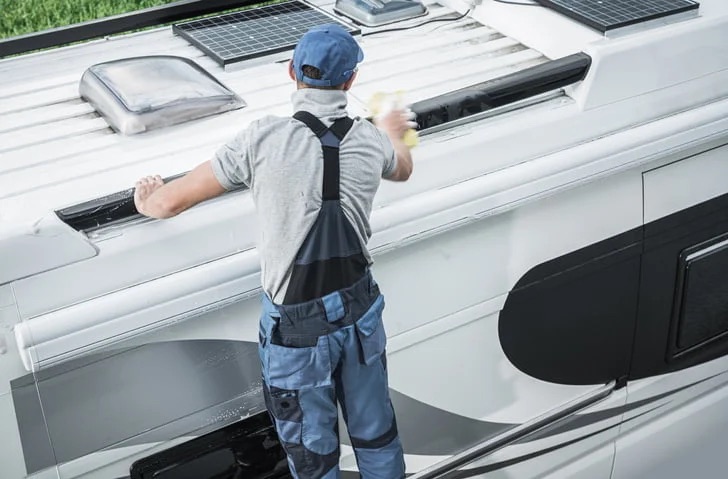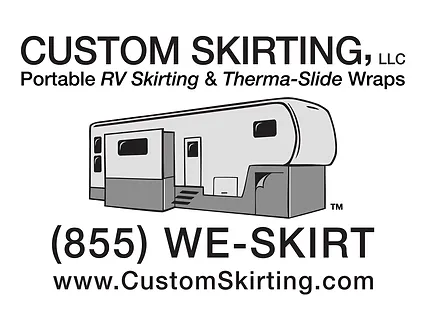
Complete Guide on RV Maintenance: 10 Essential Tips
Table of contents
- 1. Check-Up Your RV Tires
- 2. Inspect Your RV’s Roof
- 3. Do Routine Engine Checks
- 4. Maintain Your RV’s Batteries
- 5. Routine Generator Maintenance
- 6. Inspect The RV’s Slideouts
- 7. Clean Out Your Water Systems and Tanks
- 8. Check Up on The Electrical Systems
- 9. Check The Propane System for Leaks
- 10. Exterior and Interior Maintenance
- The Bottom Line
- Experience the Nation’s #1 Skirting Solution!
RV maintenance is the lifeblood of every happy camper. From checking the tires to inspecting the roof, it’s crucial to follow a comprehensive RV maintenance checklist to ensure your travel trailer is always ready for the next adventure. Regular maintenance not only enhances safety but also extends the life of your RV. In this guide, we’ll explore ten essential tips for maintaining your RV and provide you with a handy RV checklist to keep you on track.
1. Check-Up Your RV Tires
Proper tire maintenance is at the top of any good RV checklist. Begin by maintaining the correct tire pressure and monitoring tread depth. Properly inflated tires reduce the risk of blowouts and improve fuel efficiency.
Regularly check the tire condition for any signs of damage or wear. Don’t forget to rotate your RV tires to ensure even wear. Knowing when to replace your RV tires is vital, and this is typically recommended every 5 to 7 years, even if they appear to be in good condition.
2. Inspect Your RV’s Roof

The roof of your RV is a critical component and one that is particularly vulnerable to damage. Exposure to the elements, including rain, UV rays, and debris, can take a toll. Regular cleaning and inspection of the RV roof can prevent costly water damage and structural issues.
When inspecting the roof, look for cracks, leaks, or any loose seams. Repair any damage promptly to maintain the integrity of your RV. In some cases, roof replacement may be necessary, so it’s essential to catch issues early.
3. Do Routine Engine Checks
Proper engine maintenance is essential for RVs, as they typically cover long distances and often tow heavy loads. Regularly check your RV’s engine, perform oil changes, and replace filters according to the manufacturer’s recommendations.
Learning to troubleshoot common engine problems can be a valuable skill. However, some issues may require professional attention. Timely engine maintenance will keep you on the road, prevent breakdowns, and ensure fuel efficiency.
4. Maintain Your RV’s Batteries
RVs typically have two types of batteries: house batteries and starting batteries. Maintaining these batteries is crucial for uninterrupted power supply and vehicle operation.
To extend the life of your RV batteries, ensure they are fully charged and avoid deep discharges. Clean the battery terminals regularly and use a battery conditioner when storing your RV for extended periods. When batteries begin to fail, replace them promptly to prevent inconvenience on the road.
Including battery maintenance in your RV checklist ensures you always have a reliable power source.
5. Routine Generator Maintenance

RV generators play a significant role in providing power for appliances and devices when you’re off the grid. Regular maintenance is key to their reliability.
Change the oil and filters as recommended by the manufacturer. Understanding how to troubleshoot common generator problems, like failure to start or rough running, can help you avoid costly repairs while on the road.
6. Inspect The RV’s Slideouts
RV slideouts are a fantastic feature in many RVs, providing extra living space when you park. To ensure their smooth operation, lubricate slideout mechanisms and seals regularly. This reduces wear and prevents jamming.
Pay attention to any unusual sounds or misalignment when extending or retracting slideouts, as these may indicate issues that need addressing. Timely travel trailer maintenance will help you avoid inconveniences during your travels.
7. Clean Out Your Water Systems and Tanks

An RV hack that isn’t mentioned enough is to clean and functional water systems are vital for RV living. Regularly sanitize and maintain your RV’s water tanks to ensure a safe and freshwater supply.
Proper cleaning prevents bacterial growth and foul odors in the tanks. If you encounter issues like low water pressure or a water pump that doesn’t shut off, troubleshoot and address these problems promptly to maintain a comfortable living environment.
8. Check Up on The Electrical Systems
Maintaining the electrical systems in your RV is essential for safety and convenience. Regularly check and replace fuses and circuit breakers as needed to prevent electrical issues.
Learning how to troubleshoot electrical problems, like power surges or short circuits, can help you address issues while on the road. Keep your electrical systems well-maintained for an enjoyable RV experience.
9. Check The Propane System for Leaks
Propane is commonly used in RVs for heating, cooking, and refrigeration. Ensuring the safety of your propane system is a must.
Regularly check for leaks and maintain the regulator. Propane is a flammable gas, and a leaking system can pose serious safety risks. Follow the recommended guidelines for handling and using propane safely in your RV.
10. Exterior and Interior Maintenance
Beyond the specific components mentioned above, general exterior and interior maintenance is equally important. Regularly clean, seal, and protect the RV’s exterior to prevent corrosion and maintain its appearance.
Inside your RV, clean and maintain appliances and components. This includes the refrigerator, stove, HVAC systems, and more. Following the manufacturer’s recommendations for cleaning and servicing will help extend the lifespan of these components.
The Bottom Line
Regular camper or travel trailer maintenance is not just about keeping your vehicle in good condition; it’s about ensuring your safety and comfort while on the road. By following the ten essential tips outlined in this guide, you can protect your investment, prevent breakdowns, and enjoy worry-free travels.
We strongly encourage all camper owners to create a maintenance schedule and stick to it. Proactive care will save you time and money in the long run, and it will make your RV adventures more enjoyable.
Experience the Nation’s #1 Skirting Solution!
If you want to ensure proper camper maintenance and extend the life of your RV, consider Custom Skirting to prepare your vehicle for winter. Winterizing your RV is crucial, and RV skirting is an essential part of that process.
Custom Skirting offers a unique solution to protect your RV during the winter months. Our exclusive “No-Snap, No-Gap” channel system seals out water, snow, and wind more effectively than any other product on the market. With over a decade of testing and improvements, our skirting has faced the harshest winters across the northern United States and Canada, emerging as the top choice for RV enthusiasts.
When it comes to your RV skirting, don’t compromise on quality or convenience. Get Custom Skirting today, and experience the difference for yourself. Prepare your RV for winter and ensure it’s ready to hit the road when adventure calls.
